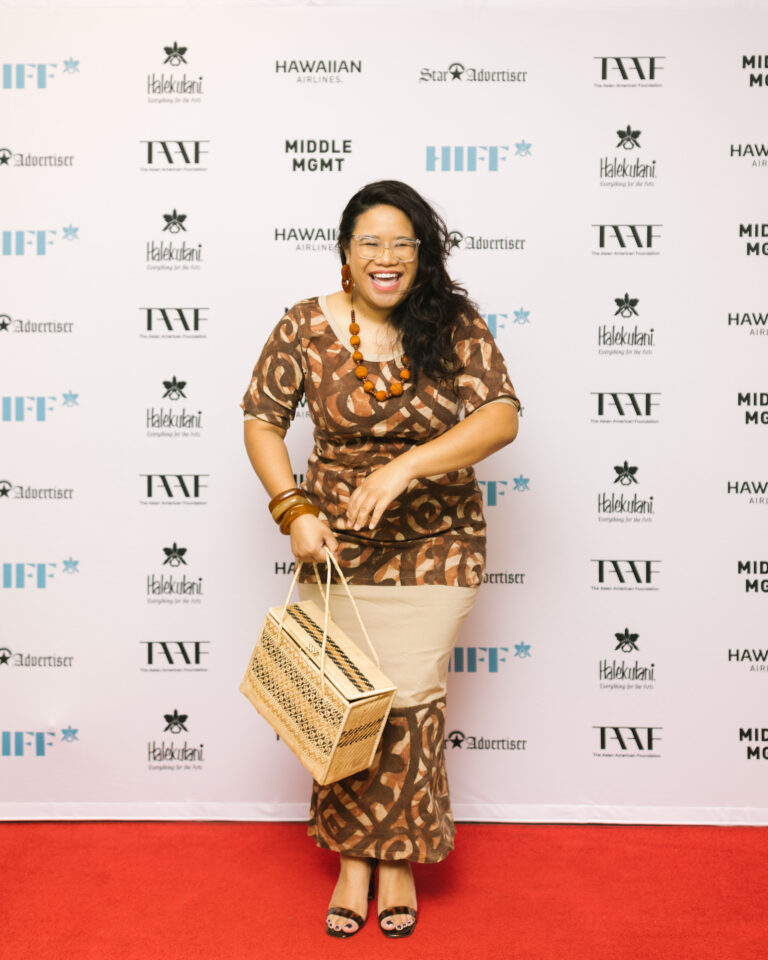TINĀ was more than just a film for me. It felt like going home. I’ve probably started this a gazillion times because every time I try, I can’t control my tears. On HIFF’s opening night, I sat in the theater and watched a Samoan film. It had our language, our cheeky humor, our culture, our songs, our harmonies—everything. And the best part? I sat in the front row next to my Samoan parents. I know the front row isn’t the best seat in the theater, but when the film is followed by a Q&A with the cast, just like that, it becomes the best seat in the house. I’ll never forget my 70-year-old dad excitedly hugging writer and director Miki Magasiva and telling him that TINĀ was the first Samoan film he ever saw. It was a dream come true.
On the red carpet, the men proudly wore an ie faitaga. The cast greeted my family like we were long-lost relatives. The way they talked to my parents made me think they knew them. Beulah Koale, who plays Sio in the film, came right up to my mom and started talking like old friends. At the opening night reception, producer Mario Gaoa spoke to me in Samoan, and it took me a minute to realize it because it’s been a while since I’ve heard someone speak to me in Samoan. Do you know how cool it is to hear my mother tongue on the lawn at HIFF? I got to take photos on the red carpet in my puletasi, wearing my mother’s jewelry and my grandmother’s handwoven lauhala purse. Just Samoans being Samoans—an ancestral gathering, don’t you think?
I felt so proud to be Samoan.
Is this how palagi kids feel all the time?!

The film follows Mareta, beautifully played by Anapela Politaivao, who, following the death of her daughter, becomes a teacher at an elite school where she starts a choir. I have to admit, when I first saw the ad for the opening night film, I almost kept scrolling. I saw the image of Mareta staring out the bus window and assumed it would be another story about Polynesian trauma. And I’m tired of Polynesian trauma being every colonizer’s bread, butter, and fetish.
But the film wasn’t about trauma. TINĀ is about hope. It’s about the moment after, the year after, the lifetime you still have to live after loss. It’s no coincidence that tina, the Samoan word for mother, and tiga, the Samoan word for pain, sound very similar when spoken aloud. You bring life into the world through immense pain. Mareta, even though she resisted, brought new life while still experiencing great pain.
Music played an integral role in the film, much like how it is a significant part of Samoan culture. If you’re ever around a group of Samoans in the middle of their feaus, you’d understand. I saw a lot of my mom in the film because, like Mareta, she was a choir director. The film opens with Mareta planning her students’ next performance, and as she listens to the song, she starts to move her hands to the choreography. When my mom watched the film, during that same part, she closed her eyes and moved her hands in sync with the same choreography.
Mareta’s daughter’s death is foreshadowed in the song she sings to her mother. The beautiful yet heartbreaking Samoan song speaks of a wish for the family to stay together but acknowledges that death has come to take them away. Mareta does get to say goodbye to her daughter before she passes—she just didn’t realize it would be the last time.
I understand Mareta’s decision not to return to her old school. Her students and her responsibilities to her other children kept her from being with her daughter on the day she died. It’s hard for anyone to return to a place from which they’re still healing. However, when Mareta snapped at Sio for calling her tinā, my heart broke. She may no longer see herself as a mom, but that’s not how others see her, even if she’s done with the responsibility. If I could selfishly request a moment in the film, it would have been for Mareta to let Sio call her tinā.
We’re all familiar with the white savior trope, but I don’t think this film falls into that category. Although Alan Hubbard, played by Dalip Sondhi, helped Mareta get a job at the school, I interpreted it more as a reminder that if you’re in a position to help, you should. If you can bring a voice into the room, do it. When Mareta saw Sophie, played by Antonia Robinson, she didn’t see a privileged palagi girl; she saw a child in pain. This likely reminded her of her own daughter, especially when Mareta scolded her for acting like a child instead of offering help when her daughter called. She had the opportunity to change that response, and she did.
Miki Magasiva, in an earlier interview with HIFF, talked about how he wanted to address uniting communities through his film. Writing this script during the pandemic greatly influenced its material, as the palagi and Samoan communities were very divided—and still are. “Even though we have a history of differences, the only way I see us overcoming them is through acceptance—and then inspiring that in the way we raise our younger generation.” It’s easy to see privilege or the lack of it before truly seeing someone for who they are.
This film had everything I didn’t know I wanted. It was funny, endearing, and charismatic. The acting was brilliant, the music evoked nostalgia, and the story was one of healing and hope. AND it was full of Samoans.
To the cast and crew of TINĀ, you have no idea what you’ve done for me and for all the other Pasifika children in the room that night. Mahalo HIFF for continuing to bring Pasifika stories to the forefront and for being the reason we were all gathered there. Mahalo for striving to bring all our voices into the room in harmony.
I want to continue to be a part of the movement that highlights Samoan talent and values. As you have done for us, I hope to help usher more Polynesians into this space.
Mai le taele o lou fatu, e momoli etu le fafetai tele lava.

Anette Arinix Amazing Aga (yes, that’s her real name) is a comedian, actor, writer, and producer homegrown here in Hawai’i. Locals might recognize her as “the wife” from those Diamond Bakery commercials or those weird bumper stickers. She’s graced the stage with theater companies like Kumu Kahua, Manoa Valley Theatre, Mo’olelo Studios, and Stage Fish. Her writing, including her first musical and play, has been featured in the Hawaii Comedy Festival and Kumu Kahua Theatre. In 2021, she co-produced the first Polynesian AF sketch comedy show with Asian AF at the 7th Annual Hawaii Comedy Festival. Anette has also produced shows like ImprovHI’s Comedy Rap Battles, Deck the Ha Ha Ha (a Christmas variety show), and Stories Out Loud, inspired by The Moth. She is OVER THE MOON to have co-produced and starred in SO MUCH NATURE.
The HIFF ONLINE CREATIVES & CRITICS IMMERSIVE (HOCCI) program supports sustainable film criticism in Hawaiʻi through mentorship and paid career opportunities for Hawaiʻi-based AANHPI critics. The mission of HOCCI is to broaden diversity in film criticism across the Pacific and use influencer branding strategies to spark career opportunities. The 2024 HOCCI is supported by Critical Minded, a grant-making and learning initiative that supports cultural critics of color in the United States.



